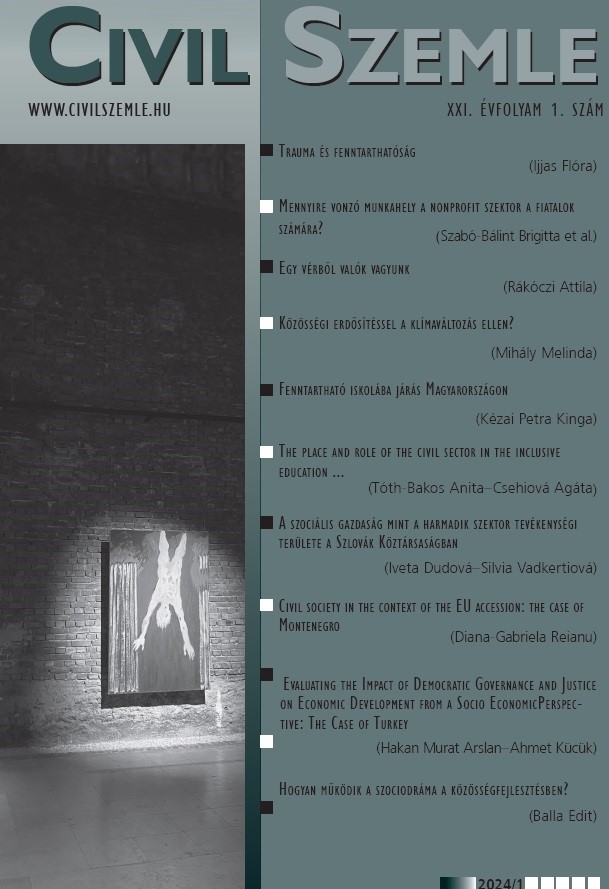The place and role of the civil sector in the inclusive education and development of children with Williams syndrome (also) through music
Abstract
Williams syndrome (WS) is an extremely rare genetic disorder. Approximately 1 in every 20 000 people has WS. Because of this, most people have never even met a child with WS. WS occupies a unique place among genetic disorders because of the fact that, in addition to a unique mix of difficulties, symptoms and abnormalities, some of their abilities and performance in certain intellectual areas are adequate or average, and in many cases above average. Relatively high level of ability includes good communication skills, outstanding verbal skills, sociability and good musical abilities with highly sensitive hearing, good musical pitch and musicality, and a very positive attitude towards music. As is typically the case for rare disorders, the most important pillar of their advocacy is the civil sphere, where NGOs and foundations support WS children and families. The great affinity and positive relationship with music justifies that a prominent part of development and inclusion are specifically music-related activities, music therapy activities. The main objective of our research is to map NGOs in Europe and beyond whose activities focus on WS patients and their families. The basis for mapping the organizations is to summarize their aims, activities and achievements and to highlight their music-related activities in line with the mission of inclusion. Our main objective is to show that the development and rehabilitation of WS patients through music and musical activities is a significant and integral part of their care within the organized framework and possibilities of the civil sector.
References
Bzdúch Vladimír, Červeňová Oľga, Justová, Vlasta (1994): Williamsov syndróm s hyperkalcémiou, hyperkalciúriou a nefrokalciózou. Česká pediatria, 49, p. 680-682.
Bzdúch Vladimír, Jariabková Katarína: História Williamsovho syndrómu. Časopis lékařů českých. 2002, 20, p. 650-668.
Bzdúch Vladimír, Jariabková Katarína (2009): Klinické príznaky v detskom veku. Pediatrie. 2009/4, p. 236-254.
Campbell Don (2002): The Mozart Effect for Children: Awakening Your Child's Mind, Health, and Creativity with Music. William Morrow Paperbacks. New York, ISBN 978-0380807444
Jariabková Katarína (2001): Osobitosti rečových schopností pri Williamsovom syndróme. Logopedica IV, Zborník Slovenskej asociácie logopédov. 2001, IV, s. 80-94.
Pober Barbara R., Dykens Elisabeth M (1993).: Williams syndrome: An overview of medical, cognitive, and behavioral features. Mental Retardation. 1993/5(4), p. 929-943.
Reis, Sall M. et al.: Williams Syndrome (2000): A Study of Unique Musical Talents in Persons with Disabilities. [online]. University of Connecticut: The National Research Center on the Gifted and Talented. Avaiable:
http://www.gifted.uconn.edu/nrcgt/newsletter/fall00/fall002.html
Sacks Oliver (2008): Musicophilia: Tales of Music and the Brain. New York: Knopf Doubleday Publishing Group. ISBN 1400033535.
Scheiber Barbara (2005): Az álmok valóra válnak: Kézikönyv a Williams szindrómás gyerekek szüleinek. Budapest: Magyar Williams szindróma társaság. ISBN 9632190408.
Scheiber Barbara (2002): Fulfilling Dreams: A Handbook for Parents of People with Williams Syndrome. Nashville, Williams Syndrome Association
Tóth-Bakos Anita (2021): Alternatív irányzatok a zenei nevelésben az inklúzió jegyében, avagy, hogyan lehet a zene tényleg mindenkié In: Parlando: A Magyar Zeneművészek és Táncművészek Szakszervezetének zenepedagógiai folyóirata. Budapest: Művészeti Szakszervezetek Szövetsége, 60/6, p. 1-18. ISSN 2063-1979.
Tóth-Bakos Anita, Csehiová Agáta (2016): Music and Brain – Music Training Transfer. INTED 2016 Proceedings: 10th International Technology, Education and Development Conference. Valencia. USB. WoS. p. 1726-1732. ISBN 978-84-608-5617-7. ISSN 2340-1079
Tóth-Bakos Anita (2022): Zeneoktatás és zeneterápia a komplex fejlesztés jegyében In: Szakképzés-Pedagógiai Tudományos Közlemények: Elmélet - eszmetörténet; Szakképzés – Pedagógia; Hallgatói vizsgálatok - pedagógusképzés. Budapest: Budapesti Műszaki és Gazdaságtudományi Egyetem, p. 151-165. ISSN 2786-1856
Tóth-Bakos Anita (2014): Zenetanulás színesen: a színes kotta módszer magyar nyelvű kiadványai. In: Parlando: A Magyar Zeneművészek és Táncművészek Szakszervezetének zenepedagógiai folyóirata. Budapest: Művészeti Szakszervezetek Szövetsége, 56/3, p. 22-22. ISSN 2063-1979



